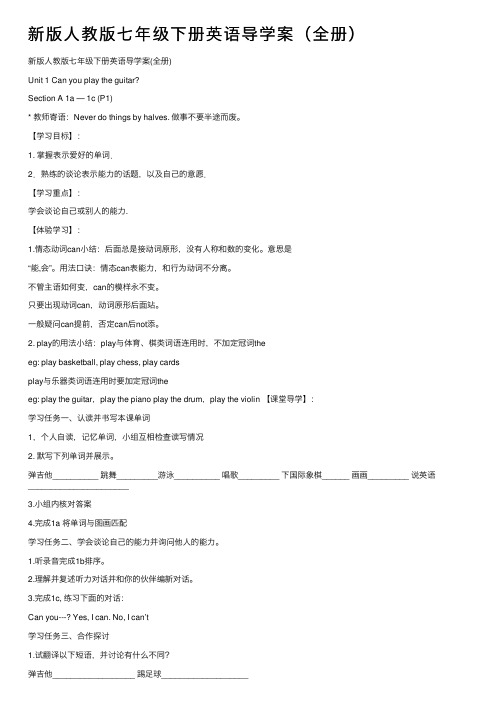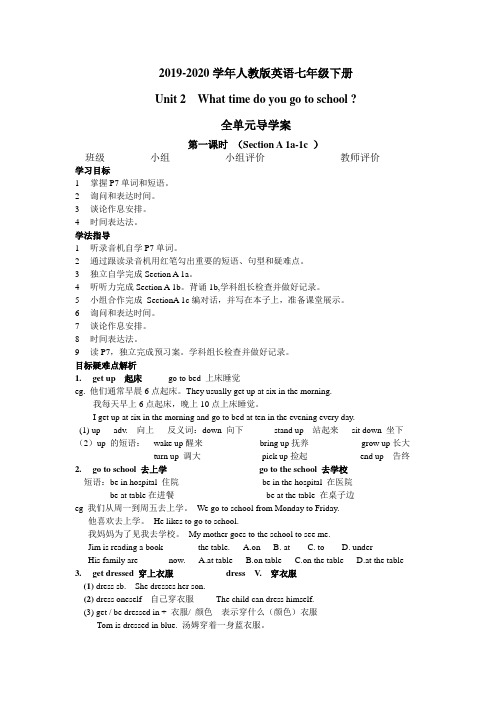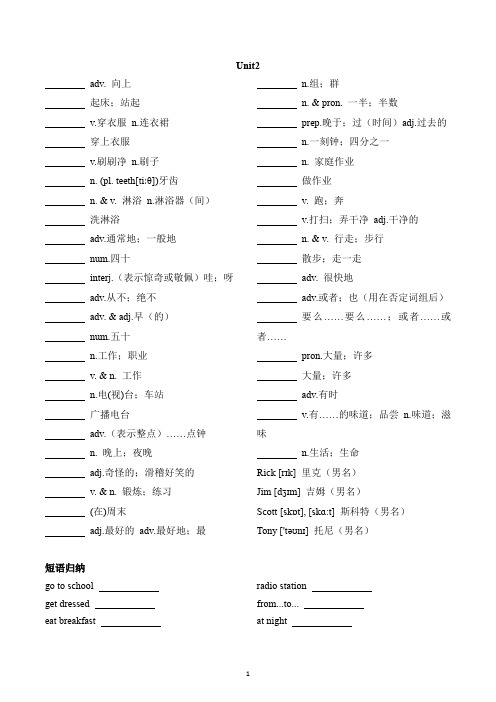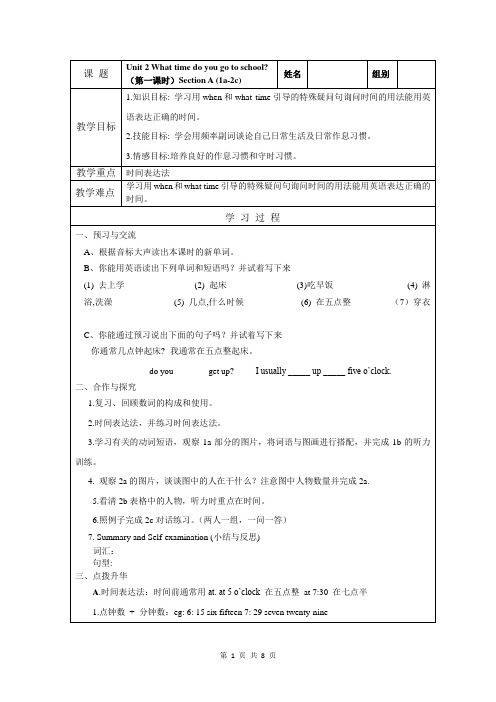七年级下Unit2 1——6课时导学案
人教版七年级英语下册导学案:Unit 1 Can you play the guitar

学习目标1.通过看图辨认单词,让学生背会有关学校文艺活动的词汇。
2.通过听录音组对话,同伴交流,能用Can引导的一般疑问句询问对方的能力,并进行肯、否回答。
3. 通过分角色表演对话,让学生运用What +club/sport 引导的特殊疑问句进行问答,询问对方想加入的俱乐部以及自己擅长的体育项目。
上课时间审核领导教与学的过程思考、点拨、小结自主学习自我检测(10分)一.自主完成1a,将单词与图片匹配。
.二.读背1a单词,并默写7个活动的单词或词组:唱歌_______________ 游泳_________________跳舞_______________ 绘画_________________下棋_______________ 讲英语_________________弹吉他_______________三.完成1b,仿照1b,自学1c,对桌交流编对话:A: I want to join the music club ?B:Can you sing ?A:Yes,I can.四.完成2a、2b听力内容。
五.根据听力内容,练习2c:用Can引导一般疑问句及其肯、否回答及Wh at club 引导特殊疑问句回答想加入什么俱乐部。
自主学习完1a、2a, 2b之后,读背并默写出下列短语:1.下棋2.讲英语3.弹吉他4.英语俱乐部5.艺术俱乐部6音乐俱乐部7棋类俱乐部8游泳俱乐部合作交流组内互测(10分)你喜欢什么活动?想加入什么俱乐部?对桌交流,互相询问:A: I want to join the music club ?B:Can you sing ?A:Yes,I can.四、盘点收获(课后反思)2分钟展示解疑点拨提升(10分)总结本节课的语法:1.情态动词can的用法:1)can后跟____________。
2)你能写出2个Can引导的一般疑问句么,并分别进行肯定和否定回答:________________________________ ____________________________________________ ____________2.默写下列句子:你想加入什么俱乐部?________________________你能进行什么运动?__________________________巩固训练、当堂检测:(每小题5分,满分100)分数:___________ 一、连词成句。
新版人教版七年级下册英语导学案(全册)

新版⼈教版七年级下册英语导学案(全册)新版⼈教版七年级下册英语导学案(全册)Unit 1 Can you play the guitar?Section A 1a — 1c (P1)* 教师寄语:Never do things by halves. 做事不要半途⽽废。
【学习⽬标】:1. 掌握表⽰爱好的单词.2.熟练的谈论表⽰能⼒的话题,以及⾃⼰的意愿.【学习重点】:学会谈论⾃⼰或别⼈的能⼒.【体验学习】:1.情态动词can⼩结:后⾯总是接动词原形,没有⼈称和数的变化。
意思是“能,会”。
⽤法⼝诀:情态can表能⼒,和⾏为动词不分离。
不管主语如何变,can的模样永不变。
只要出现动词can,动词原形后⾯站。
⼀般疑问can提前,否定can后not添。
2. play的⽤法⼩结:play与体育、棋类词语连⽤时,不加定冠词theeg: play basketball, play chess, play cardsplay与乐器类词语连⽤时要加定冠词theeg: play the guitar,play the piano play the drum,play the violin 【课堂导学】:学习任务⼀、认读并书写本课单词1,个⼈⾃读,记忆单词,⼩组互相检查读写情况2. 默写下列单词并展⽰。
弹吉他__________ 跳舞_________游泳__________ 唱歌_________ 下国际象棋______ 画画_________ 说英语______________________3.⼩组内核对答案4.完成1a 将单词与图画匹配学习任务⼆、学会谈论⾃⼰的能⼒并询问他⼈的能⼒。
1.听录⾳完成1b排序。
2.理解并复述听⼒对话并和你的伙伴编新对话。
3.完成1c, 练习下⾯的对话:Can you---? Yes, I can. No, I can’t学习任务三、合作探讨1.试翻译以下短语,并讨论有什么不同?弹吉他__________________ 踢⾜球___________________2.讨论如何询问第三⼈称能⼒的句型---Can he sing? ---Yes, he can. / No, he can't.---Can Tom speak English? ---Yes, he can. / No, he can't.【⾃主检测】:I.精挑细选1. Can you ________ English?A. speakB. talkC. say2. Can he __________ basketball?A. playB. playsC. playing3. My brother want _______ the chess club.A. joinB. to joinC. joins4. Mary can play the chess________ she can't swim.A. andB. orC. but5. His brother plays _______ piano every day.A. /B. aC. theII.翻译官说英语_____________ 弹吉他_____________ 象棋俱乐部__________ 下象棋______________ 英语俱乐部_____________ ⾳乐俱乐部__________ 美术俱乐部___________ 游泳俱乐部_____________ 参加___________ Ⅲ. 补全对话A. Can you ___________(唱歌)?B. Yes, I ________. Can you _________(游泳)?A. No, I want to join _______________(象棋俱乐部).B. I don't like ______________(象棋)A. What club do you want to __________?Unit 1 Can you play the guitar?Section A 2a— 2d (P2)* 教师寄语:Never do things by halves. 做事不要半途⽽废。
2019-2020年人教版英语七年级下册Unit 2 What time do you go to

2019-2020学年人教版英语七年级下册Unit 2 What time do you go to school ?全单元导学案第一课时(Section A 1a-1c )班级小组小组评价教师评价学习目标1掌握P7单词和短语。
2询问和表达时间。
3谈论作息安排。
4时间表达法。
学法指导1听录音机自学P7单词。
2通过跟读录音机用红笔勾出重要的短语、句型和疑难点。
3独立自学完成Section A 1a。
4听听力完成Section A 1b。
背诵1b,学科组长检查并做好记录。
5小组合作完成SectionA 1c编对话,并写在本子上,准备课堂展示。
6询问和表达时间。
7谈论作息安排。
8时间表达法。
9读P7,独立完成预习案。
学科组长检查并做好记录。
目标疑难点解析1.get up 起床go to bed 上床睡觉eg. 他们通常早晨6点起床。
They usually get up at six in the morning.我每天早上6点起床,晚上10点上床睡觉。
I get up at six in the morning and go to bed at ten in the evening every day.(1) up adv. 向上反义词:down 向下stand up 站起来sit down 坐下(2)up 的短语:wake up醒来bring up抚养grow up长大turn up 调大pick up捡起end up 告终2.go to school 去上学go to the school 去学校短语:be in hospital 住院be in the hospital 在医院be at table在进餐be at the table 在桌子边eg 我们从周一到周五去上学。
We go to school from Monday to Friday.他喜欢去上学。
He likes to go to school.我妈妈为了见我去学校。
人教版英语七年级下册unit2导学案(单词,词汇变形,短语,用法,语法,作文)(无答案)

Unit2adv. 向上起床;站起v.穿衣服n.连衣裙穿上衣服v.刷刷净n.刷子n. (pl. teeth[tiːθ])牙齿n. & v. 淋浴n.淋浴器(间)洗淋浴adv.通常地;一般地num.四十interj.(表示惊奇或敬佩)哇;呀adv.从不;绝不adv. & adj.早(的)num.五十n.工作;职业v. & n. 工作n.电(视)台;车站广播电台adv.(表示整点)……点钟n. 晚上;夜晚adj.奇怪的;滑稽好笑的v. & n. 锻炼;练习(在)周末adj.最好的adv.最好地;最n.组;群n. & pron. 一半;半数prep.晚于;过(时间)adj.过去的n.一刻钟;四分之一n. 家庭作业做作业v. 跑;奔v.打扫;弄干净adj.干净的n. & v. 行走;步行散步;走一走adv. 很快地adv.或者;也(用在否定词组后)要么……要么……;或者……或者……pron.大量;许多大量;许多adv.有时v.有……的味道;品尝n.味道;滋味n.生活;生命Rick [rɪk] 里克(男名)Jim [dʒɪm] 吉姆(男名)Scott [skɒt], [skɑ:t] 斯科特(男名)Tony ['təʊnɪ] 托尼(男名)短语归纳go to school get dressed eat breakfast radio station from...to... at nighton weekendsfrom Monday to Friday in the afternoonhave a good jobgo homeplay sportshave much timebe good forafter schoolhave a healthy life either ... or ....get upbrush one’s teeth take a showerradio showgo to workbe late forin the morningdo one’s homework go to bedclean my roomtake a walkplay computer games lots ofhalf an hour用法总结1.询问在几点做某事What time do/does sb do sth...? 某人几点做某事?When do/does sb do sth..? 某人什么时候做某事?2.表达某人从不做某事Sb never do / does sth 某人从不做某事3.关于时刻的表达At + 具体时间点在几点Half past+基数词....点半A quarter past + 基数词...点一刻 A quarter to + 基数词差一刻到...点4.系动词taste用法:sth taste(s) + adj. 某物尝起来....5.always, often, usually, sometimes, never词汇梳理Tooth n. 牙齿→teeth(复数)Early adv. 早的→(反义词)Late adv.adj晚的Funny adj. 奇怪的,滑稽好笑的→Fun n. 娱乐,快乐Half n.pron 一半,半数→(复数)halvesClean v. 打扫,弄干净adj. 干净的→cleaner n.清洁工Life n. 生活,生命→(复数)livesWe want to go to Hainan ______(在某一时候).I play basketball with my friends ______(有时).My father goes to Beijing ______ ______(好几次)a year.写作:根据下面日程表的内容,以“My school day”为题,写一篇不少于60词的短文。
七下英语导学案Unit1-2

【学习目标】1. 掌握单词:pal, live, country, Canada, France, Japan, Australia, Singapore, Sydney, Paris, Toronto, Tokyo短语:pen pal, the United States, the United Kingdom, New Y ork 名字: Jodie, Andrew2. 掌握句型:–Where’s your pen pal from? –She’s from Japan.–Where does she live? –She lives in Tokyo.【学习重点】学会谈论人们的国籍和居住的城市。
【学习过程】一. 自主学习学习任务一: 熟练掌握本课单词1. 你能读音规则正确朗读根据下面的单词吗?/ / p a l C a nada Jap a n P a ris Fr a nce A ndrew/ / S i ngapore Par i s countr y Tok y o S y dney/ / T o ky o Toront o J o die/ / Singap ore Y or k2. 你能根据已学单词的发音推断生词的读音吗?c ou sin—c ou ntry / / favor i te—l i ve / /sal a d—Can a d a—J a pan / / fr o m—Tor o nto / /t o mato—T o ronto—kingd o m / / bec au se—Au stralia / /3. 你能从学习目标的生词和短语中找出下列两类词吗?cities: __________ __________ __________ __________ __________countries: __________ __________ __________ __________ __________ __________ __________ 4. 这些城市分别在哪个国家?你还知道这些国家的别的城市吗?运用所学词汇说说看!__________ is a city in __________. __________ is a city in __________. __________ is a city in __________. __________ and __________ are cities in __________. __________ and __________ are cities in __________.5. 听录音1b, 写出你听到的城市名称:__________ __________ __________ __________6. Where are these cities? Complete the chart below:City ———Country City ———Country Sydney ________________ New Y ork ________________Paris ________________ Toronto ________________Tokyo ________________ Beijing ________________ 7. 听录音2b, 写出下列同学的笔友所在的城市和国家名称:Person country cityJohn’s pen pal ________________ ________________Jodie’s pen pal ________________ ________________Andrew’s pen pal ________________ ________________学习任务二: 掌握本课句型8. 请根据上面的表格作一个report:John’s pen pal is from __________________. He lives in ________________. Jodies’s pen pal ____________ _________________________________________________________. Andrew’s pen pal __________________ _________________________________________________________.Questions: ____________________________________? _______________________________________? 二. 合作共建请介绍你们小组三个同学的笔友情况,并针对你们的介绍提两个问题。
2014春七年级下册英语Unit2导学案

B. always与usually的区别:表示动作频率的词,主要有usually/ sometimes/always/often。程度的区别为:
always(100%)>usually(80%)>often(60%)>sometimes(40%)>seldom(20%)>never(0%)
( ) 3. —— _________ is your art teacher?
—— Mrs. Zhang.
A. Who B. What C. When D. Where
( ) 5.——What ________does he like best?
——Football.
A. food B. subject C. color D. sport
2) I usually go to bed at 10:00.(变否定句)I _____ usually _____to bed at 10:00.
3)LinHai helps his mother with the housework on Sundays.(变否定句)
LinHai _____ ______mother with the housework on Sundays.
课题
Unit 2 What time do you go to school?(第一课时)Section A (1a-2c)
姓名
组别
教学目标
1.知识目标:学习用when和what time引导的特殊疑问句询问时间的用法能用英语表达正确的时间。
2.技能目标:学会用频率副词谈论自己日常生活及日常作息习惯。
2019-2020学年七年级英语下册 Unit 2 What time do you go to school知识点总结+导学案(新版)人教新目标版
2019-2020学年七年级英语下册 Unit 2 What time do you go to school知识点总结+导学案(新版)人教新目标版学习目标:1.熟练读出书写本节课的表示活动的单词。
2.学会询问时间的句型,熟练的谈论表示时间的话题。
重难点:what time/when 引导的特殊疑问句;频率副词的用法。
情感目标:通过询问和谈论彼此的作息习惯,培养良好的学习习惯。
学习过程:Ⅰ.【课前热身】预习效果检测: 默写下列短语。
去上学起床跑步吃早餐洗澡通常几点,什么时候穿上衣服刷牙Ⅱ.【自主学习】1.给图片找到对应的短语 1a2.听录音完成下列部分1b,2a,2bⅢ.【合作学习】与同伴练习1b中的对话Ⅳ.【拓展提升】根据1b,2b部分创编新对话, 完成1c,2c对话表演。
Ⅴ.【答疑解惑】针对本课提出困惑的知识点或问题。
Ⅵ.【课堂小结】总结本课所学知识点。
Ⅶ.【达标检测】一、翻译句子。
1.你通常几点钟起床?What _______ do you ________get ________?2.我通常在12:00吃午餐。
I ________ eat _______ ________12:00.3.你通常什么时候起床?______do you usually _____ ______?4.我通常6点钟起床。
I usually _____ _____at six______.5. 我从来不起这么早。
I _____get up so______.6. 他有一份有趣的工作。
He _____ an ______ job.备课人:7. 那是一个有趣的早餐时刻。
That’s a ____time ______ _______.8、It’s 7 o’clock.(对划线部分提问)______ ______ is it?9、Alicia takes a shower at 9:00 (对划线部分提问)______ _____ does Alicia ______ ___ ________?10、Jim gets up at 6:00 in the morning.(变成否定句)Jim _______ ____ ____ at 6:00 in the morning.11、他们总是在7:20穿衣服。
人教新目标七年级下册英语导学案Unit 2 What time do you go to school
承德四中年级学科导学案.主备人:审核人:审批人:编号:课题:Unit 2 What time do you go to school? 第一课时课型:听说课第一标:设置目标(5分钟)【学习目标】知识目标1:能掌握以下单词和短语:up, dress, brush, tooth (pl. teeth), shower, get up, get dressed, brush teeth,take a shower, go to school, eat breakfast2.能掌握以下句型:①—What time is it? —It’s ….②—What time do you usually get up? —I usually get up at six thirty.③—What time does Bob usually get up? —He usually gets up at five thirty. 第二标:达成目标(25分钟)学法指导1.Pairwork(要求学生两人一组练习。
): —What time is it? —It’s ….2. 听录音,完成活动1b,把时间与活动的匹配(组内检查)。
3.谈论日常生活:—What time do you usually get up? —I usually get up at six thirty.4.听录音,完成活动2a,2b(组内检查)。
小组内复述Jim一家的淋浴时间,第三标:反馈目标(15分钟)一. 根据汉语写单词、短语:起床_______________穿上衣服___________________洗淋浴_________________刷、刷净__________________牙齿(单、复数形式)________ __________二、翻译句子:Time is money. Time is life. Time flies. ______三. 单项选择:( )1. Tony usually gets up___5 o’clock. A. in B. at C. on D. about ( )2. —W hat’s the English for 8:10? —It’s ______.A. eight tenB. ten eightC. ten to eightD. eight past ten( )3. He_____up at 7:00 and_____the early morning news(新闻) on TV.A. gets, seesB. get, watchC. gets, watchesD.get, see( )4. What time _______she_______?A. do, go to schoolB. does, goes to schoolC. does, go to the schoolD. does, go to school( )5. _______does your father usually ____ a shower?A. What time, takesB. What’s time, takeC. What time, ta keD. What’s time, takes( ) 6.He gets up early. So he has ______ time for breakfast.A. manyB. a lotC. lots ofD. lot of四、句型转换。
人教7七年级初一下新版第二单元unit2 what time do you get up讲学稿导学案知识点讲解
第二周知识点剖析1.get up 是一个固定词组,意为“起床” .相似的说法还有“be up”.如: He gets up very early. = He is up very early.另外,get 与不同的词组搭配,还有很多固定词组.如:get back 归还,取回. get home 到家get …for 为某人拿/买get …from 从某人那得到2. go to school “上学”是一个固定词组,go 也有很多的固定搭配。
如:go to a movie go home go shopping3.run 是一个动词, 意为“跑” .run 的第三人称单数和现在分词是:runs, running.固定搭配, run after.4. eat breakfast 吃早饭eat breakfast =have breakfast5. take a shower “洗澡” ,这是一个固定词组, 其中take 可以由have 代替.take a shower= have a shower 类似的短语还有take/ have a rest take/have a walk6. do you usually go to school/ get up? 你通常何时上学/ 起床?I usually run/ She usually gets up at around 7:00. 我/ 她通常大约7:00跑步/ 起床。
Does she usually go to school/ get up?7.what time 和when 的区别1)询问具体的时间,两者都可以使用When do you get up? What time do you get up?2)询问钟表表示的时间只能用what timeWhat time is it now?3)询问时间段只能用whenWhen do you watch TV? I watch TV in the evening.二、利用时间表达法,自由的表达5:00 five o'clock 6:00 six o'clock 7:00 seven o'clock 8:00 eight o'clock9:02 nine two 10:20 ten twenty 11:35 eleven thirty-five【课堂练习】一、英汉互译。
人教版七年级下册英语导学案:Unit 2 What time do you go to school
Unit 2 What time do you go to school?Period 1(Section A 1a~2c)自主学习课前诊断一.温故互查1起床 2. 去上学3.穿衣服4.刷牙5.吃早饭6.洗澡7.几点8.Jim的家9.我的最后一个问题二.设问导读Task 1. New words and sentences patterns.1. How to ask the timeA:What time is it?B:It’s …2.PairworkA:What time do you usually…?B:I usually ….at….3. PairworkA:What time does he/she…?B:He/She… s/es at…Task2. ListeningI Before listeningRead the statements in 1b.II.While listening1.Listen and choose the right answer. (1b)2. Listen and then finish 2a and 2b.III.After listeningFill in the missing word.Rick has a_______ morning. He usually gets up at ________ .He brushes his teeth and takes a showerat___________At seven o’clock ,he has ________ .He usually gets________at seven twenty .And then he usually goes to school at seven __________ .三.自学检测根据汉语提示补全下面的短文。
I usually______(起床) at 6:50. I have milk and bread____ breakfast. After breakfast, I ____________ (洗澡)and then I __________(上学) by bus. I get to school at 7:50. I have five classes in the morning. And then I have lunch at 12:10. In the afternoon I have two classes. I _______(回家) at 3:30. I get home at 4:30 p.m.I __________(吃晚饭) at about 8:30. After dinner, I ___________(做作业) . I _________ (睡觉) at 10:00. My life is busy but not exciting.互动学习问题解决What time ,when ______is your birthday ?It’s May 6th .__________do people have lunch ? In the evening .___________do you go to school ? At 7:00 .Shower .I usually take a _____at 6:00 in the morning .My family has a ______.What time do you usually ______?学用结合提高能力单项选择( ) 1.Jones often gets up _____7:30 _____ the morning.A. in; atB. at; inC. at; on( ) 2. —My birthday is _____ June. When is your birthday?— It’s _____ Tuesday, June 7th .A. in; inB. on; onC. in; on( ) 3. Bob wants to have a party _____ the evening of June 5th.A. onB. inC. at( ) 4. Lucy gets up early to meet his friend_____ Sunday morning.A. onB. inC. at( ) 5. Let’s meet _____15:00 this afternoon..A. atB. inC. on课堂小结,形成网络介绍你的早晨。
- 1、下载文档前请自行甄别文档内容的完整性,平台不提供额外的编辑、内容补充、找答案等附加服务。
- 2、"仅部分预览"的文档,不可在线预览部分如存在完整性等问题,可反馈申请退款(可完整预览的文档不适用该条件!)。
- 3、如文档侵犯您的权益,请联系客服反馈,我们会尽快为您处理(人工客服工作时间:9:00-18:30)。
Unit 2 What time do you go to school?By Miss Zhang【学习目标】1.知识目标: 学习用when和what time引导的特殊疑问句询问时间的用法,能用英语表达正确的时间。
2.技能目标: 学会用频率副词谈论自己日常生活及日常作息习惯。
3.情感目标: 培养良好的作息习惯和守时习惯。
【学习重点】1、熟记本单元单词及短语。
2、掌握句型:----What time do you usually get up? what time=when 几点----I get up at six o’clock.----What time is it? What time is it?=what’s the time?----It’s eight thirty.【学习难点】1.学会运用what time和when对时间提问及二者的区别。
2. 学会认读时刻表。
【自学指导】1.自学121-122页的单词。
2.自学第9 页关于对时间提问的语法知识。
3.小组合作探究句型,准备课堂展示。
【自主探究学习】预习课文, 试着翻译下列短语和句子, 相信自己是最棒的!(1) 去上学___________ (2) 起床__________ (3)吃早饭_______ _____(4) 淋浴,洗澡_____________ (5) 几点,什么时候____________(6) 在五点整______ __(7)乘第17路公共汽车______________ (8) 刷牙(9)到达(10)在夜间(11)起床(12)很快,不久(13)在上午(14)听……(15)写信(16)get home (17)at eleven _____________ (18) go to bed(19) -你通常几点钟起床? -我通常在五点整起床。
-_____ _____ do you _______ get up? -I usually _____ up _____ five o’clock.(20) -她通常几点钟去上学? -她通常在七点整去上学。
-What time _______ she usually _______ ________ _________?-She usually _______ to school _________ seven o’clock.课堂学习Section A (The first period 1a-2c)【学习目标】1. 理解本单元生词和短语。
2. 会询问和表达时间。
3. 会谈论日常作息习【合作探究】Step 1: Deal with 1a.Step 2: listen and finish 1b--1c, then ask and answer in pair.3.Take a shower固定短语,相当于have a shower . 【课后反思】1、我的收获:Words and expressions:课堂学习 Section A (The second period 2d-Grammar Focus) 【学习目标】1. 熟练掌握单词和短语2. 背诵2d 并默写。
3. 熟练掌握Grammar Focus (语法聚焦)【知识点拨】2. 3. Then I eat breakfast at nine.eat breakfast = have breakfast (lunch/supper/dinner) 3. That’s a funny time for breakfast.funny adj.滑稽可笑的,奇怪的。
【记住表示“有趣”时,不可以用funny 哟!】funny 是由名词fun 双写n 再加形容词后缀y 构成的形容词。
如 sun-sunny. 5. exercise v. “锻炼” I often exercise in the morning.n. “锻炼,运动”,不可数名词。
You should take more exercise in your free time.“体操,练习”,可数名词。
We do morning exercises every day.I want to do my English exercises.6. usually 频率副词,在英语中还有 always ,sometimes , often , never 等。
用来表示动作或状态的频率,通常用在be 动词、助动词或情态动词之后,行为动词之前。
例如:He is often late for class. Jim usually goes to bed at nine. 【语法聚焦】1. 分角色问答。
2. 小组讨论。
3. 学生展示,教师归纳。
【课堂达标】单项选择:1. — _______ do you play basketball?—On weekends.A. WhenB. HowC. What timeD. Where2. She gets up _____ six fifty.A. atB. onC. inD. for3. When ___ Mr. Smith ____ breakfast?A. do; eatB. do; eatsC. does; eatD. does; eats4. Rick has a shower every morning.A. takesB. buysC. goesD. eats5. Scott gets up early, and he’s ____ late for school.A. alwaysB. usuallyC. oftenD. never用所给词的适当形式填空:1. The little girl can get _____ (dress) by herself.2. Tom brushes his _____ (tooth) before he goes to school.3. Mr. Li usually ______ (exercise) in the morning.4. What a ____ (fun) story it is!5. There are some _____ (brush) in the box.【课后反思】1、我的收获:Words and expressions:Sentences :课堂学习Section A (The third period 3a-3c)【学习目标】1. 熟练掌握单词和短语。
2. 背诵语法重点并能默写。
3. 能熟练运用所学知识进行交际活动。
【复习检查】一. (英汉互译,限时3分钟)1.牙齿2.在五点起床3.刷牙4.去上班5. 到家6.弹吉它7.早饭后8. take …to…________ 9. 看早间新闻___________ 10.上床睡觉______________ 11.听老师讲课________ 12. 爱,喜爱______________ 13.告诉,讲述____________ 14. 给……写信___________ 15.大约在八点_______________二.语法复习(Grammar Focus)【合作探究】1. Question and Answer in pair and finish 3a.2. Show yourself and finish 3b.3. Perform and finish 3c.【课堂达标】Ⅰ.组词成句。
1. time, is , it, what____________________________________________________?2. does, get up, she, time, usually, what________________________________________?3. soccer, he , time, play, what, does,____________________________________________?4. plays, she, piano, the, eight, at, about, often, ___________________________________?5. school, often, at, 6:30, go, I, to,____________________________________________?II. 搭配。
1.What a. nine o’clock2.It’s b. a t six o’clock3.What time does she c. you usually eat breakfast4. I usually get up d. time is it5.What time do e. play soccerⅢ. 根据句意,完成句子。
1. —上学日你几点起床?— What time do you get up _____ _____ _____.—我通常6:20起床。
— I ____ get up ____ 6:20.2. —你最要好的朋友几点去上学?— What time _____ your ____ friend go to school?—他总是6:40去上学。
—He _____ _____ to school at 6:40.3.—吉姆几点吃早饭?—What time _____ Jim _____ breakfast?—他从不吃早饭。
—He ______ ______ breakfast.Ⅳ.用适当的词填空,补全下面的短文:I usually _______(起床)at _______. I have milk and bread for breakfast. After breakfast, I _______(洗澡)and then I _______(上学)by bus. I get to school at _______ I have five classes in themorning. And then I have lunch at ________. In the afternoon I have two classes. I ______(回家)at _______. I get home at 4:30 p.m. I _______(吃晚饭)at about _______. After dinner, I _______(做作业). I _______(睡觉)at _______. My life is busy but not exciting.Section B课堂学习(The fourth period 1a-2a)【学习目标】1.通过看图说话,师生问答,听录音等形式,掌握新单词half , past, quarter, homework, run, walk, clean并掌握关于日常作息时间的表达2. 通过师生问答,角色表演等形式学会When do students usually eat dinner ?They usually eat dinner at a quarter to seven in the evening.【学习重点】1.时间表达法。
